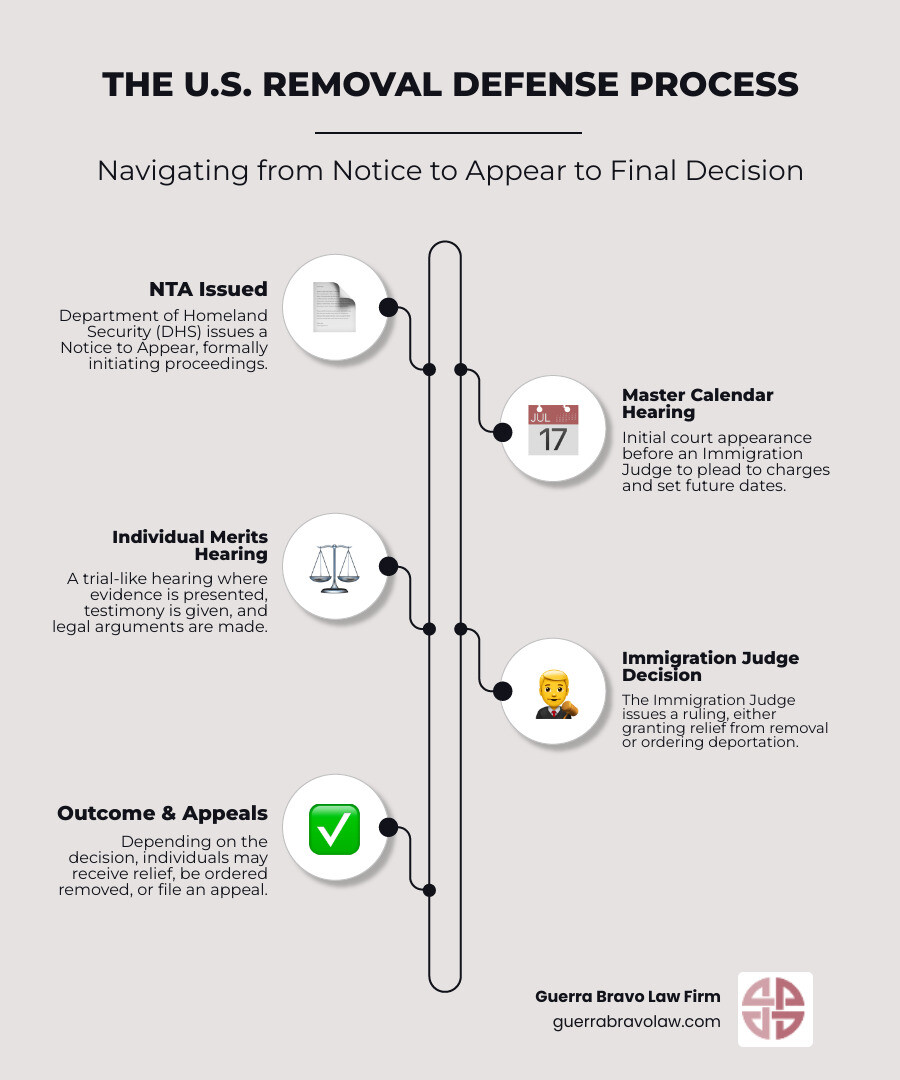
The Right Defense: Securing a Top Removal Defense Lawyer Near You
Understanding Removal Defense and Its Critical Importance
A removal defense lawyer is an immigration attorney who represents individuals in U.S. Immigration Court, helping them fight deportation and secure their right to remain in the United States.
Key Services of a Removal Defense Lawyer:
Case Analysis - Review charges and identify all possible defenses
Court Representation - Argue your case before immigration judges
Relief Applications - File for asylum, cancellation of removal, or other protections
Bond Hearings - Secure release from ICE detention
Appeals - Challenge negative decisions at higher courts
Receiving a Notice to Appear (NTA) begins one of the most consequential legal battles of your life. The statistics are stark: immigrants with legal representation win their cases over 60% of the time, while unrepresented individuals succeed in less than 17% of cases.
The U.S. immigration court system has a backlog of over 1.7 million cases, and the average case takes 646 days to complete. In fiscal year 2023, 37% of the 433,718 completed cases resulted in removal orders, making early legal intervention crucial.
Why Legal Representation Matters:
Immigration law is incredibly complex. The government has trained attorneys arguing for your removal; you need an experienced advocate fighting for your right to stay. A removal defense lawyer analyzes your situation, identifies defenses, gathers evidence, and builds the strongest case possible. They understand procedural requirements, filing deadlines, and how to present compelling arguments to judges.
The consequences of removal are severe. A removal order can ban you from returning for years or permanently, separating you from family and destroying the life you've built in America.

Grounds for Removal: Common Reasons for Deportation

Understanding why the government might try to remove you is the first step in building a defense. The legal grounds for removal are complex, but many can be challenged with the right legal strategy.
United States: Common Grounds for Deportation
The U.S. government can initiate removal proceedings for specific legal reasons outlined in immigration law.
Immigration Status Violations
Visa Overstay: Remaining in the U.S. after your authorized period of stay has expired.
Unauthorized Employment: Working without the proper authorization from immigration authorities.
Violating Visa Terms: Failing to maintain the conditions of your visa, such as a student not attending classes.
Criminal Convictions Even lawful permanent residents can face deportation for certain crimes.
Aggravated Felonies: A broad category of serious crimes, including some theft and drug trafficking offenses.
Crimes Involving Moral Turpitude (CIMT): Offenses involving dishonesty, fraud, or acts considered morally wrong. A single CIMT conviction within five years of entry can trigger removal.
Drug, Firearm, and Domestic Violence Offenses: Even minor convictions in these categories can have severe immigration consequences.
Before pleading guilty to any criminal charge, it is crucial to discuss the immigration consequences with a removal defense lawyer. For more details, see our guide on What Crimes Are Eligible for Deportation.
Fraud and Misrepresentation
Marriage Fraud: Entering a marriage solely for immigration benefits.
False Claims to U.S. Citizenship: Falsely claiming to be a citizen to obtain a job, vote, or receive benefits.
Document Fraud: Using fake documents or lying on immigration applications.
Security and Other Grounds These include the most serious grounds, such as espionage, sabotage, or terrorist activities. Public charge grounds may also apply if someone becomes primarily dependent on government assistance.
Canada: Grounds for Inadmissibility
Canada's Immigration and Refugee Protection Act (IRPA) has its own rules. Grounds for inadmissibility include:
Criminality: Both serious and general criminality, based on how the offense is treated under Canadian law.
Misrepresentation: Providing false information or withholding facts on an immigration application.
Non-compliance with IRPA: Overstaying a visa or working without a permit.
Security and Human Rights Violations: Espionage, terrorism, or war crimes.
If any of these situations apply to you, contact an experienced removal defense lawyer immediately. Early intervention is key.
The Removal Process: Navigating the U.S. and Canadian Systems
The U.S. and Canadian immigration systems have distinct procedures for determining whether a person can legally remain in the country. Understanding these processes is essential for your defense.
The U.S. Removal Process
The U.S. removal process is a formal legal proceeding that moves through several phases.
Initiation of Proceedings: The process begins when the Department of Homeland Security (DHS) issues a Notice to Appear (NTA). This legal document specifies the immigration laws the government believes you have violated and orders you to appear before an immigration judge.
Immigration Court (EOIR): Your case is heard by an immigration judge from the Executive Office for Immigration Review (EOIR).
Master Calendar Hearing: This is your first court appearance. The judge reads the charges, and you admit or deny them. You also state what forms of relief from removal you intend to seek. Having a removal defense lawyer at this stage is critical to making informed choices.
Individual Merits Hearing: This is your trial. You and your attorney present evidence, call witnesses, and testify. The government attorney argues for your removal. The judge then decides if you are removable and if you qualify for relief.
Detention and Bonds: Immigration and Customs Enforcement (ICE) can detain you during removal proceedings.
Bond Hearings: A hearing is held before an immigration judge to determine if you can be released on bond. The judge considers if you are a flight risk or a danger to the community. A removal defense lawyer can argue for a reasonable bond.
Types of Bonds: A Delivery Bond secures your release from ICE detention. A Voluntary Departure Bond may be required if you are granted permission to leave the U.S. voluntarily.
The Canadian Removal Process
Canada's system involves different removal orders with varying consequences.
Types of Removal Orders: A Departure Order is the most lenient, allowing you to leave voluntarily within 30 days without a future bar. An Exclusion Order bans you from returning for one to five years. A Deportation Order is a permanent bar.
Detention and Reviews: The Canada Border Services Agency (CBSA) can detain individuals. The Immigration and Refugee Board (IRB) conducts regular detention reviews to assess if continued detention is justified.
Pre-Removal Risk Assessment (PRRA): This assessment allows individuals to seek protection if they fear persecution, torture, or risk to their life upon return to their home country. Detailed eligibility criteria are available on the government website.
Navigating either system requires deep legal knowledge. The procedures are complex and the deadlines are strict, making a dedicated removal defense lawyer your most valuable ally.
Building Your Case: Key Strategies and Relief Options with a Removal Defense Lawyer

With a skilled removal defense lawyer, there are many strategies that can lead to staying in the United States. A strong defense requires legal expertise and a unique approach to your case. Understanding your options through Immigration Education is the first step.
The Crucial Role of Your Removal Defense Lawyer
A removal defense lawyer is your strategic partner and guide. Their role includes:
Case Analysis: Examining every detail of your immigration history and the government's charges to uncover potential defenses.
Identifying Defenses: Using deep knowledge of immigration law to find errors in the government's case or arguments that you are not legally removable.
Navigating Deadlines: Managing all paperwork and filing deadlines to prevent an automatic removal order.
Arguing on Your Behalf: Preparing your case, cross-examining witnesses, and presenting compelling legal arguments in court.
Negotiating with Government Attorneys: Seeking favorable outcomes like administrative closure or beneficial stipulations.
Filing Appeals: Challenging negative decisions with the Board of Immigration Appeals and federal courts.
Common Forms of Relief from Removal in the U.S.
Even if found removable, you may be eligible to stay through various forms of relief.
Cancellation of Removal: A form of relief for certain long-term residents. Permanent residents may qualify if they have held a green card for five years and resided in the U.S. for seven, without an aggravated felony conviction. Non-permanent residents must prove ten years of physical presence, good moral character, and that their removal would cause "exceptional and extremely unusual hardship" to a qualifying U.S. citizen or permanent resident relative.
Asylum, Withholding of Removal, & CAT: These protections are for individuals who fear returning to their home country. Asylum is for those facing persecution based on race, religion, nationality, political opinion, or social group. Withholding of removal and Convention Against Torture (CAT) protection prevent deportation to a country where you would likely face torture or other serious harm.
Adjustment of Status: This allows you to become a permanent resident in immigration court, often through a qualifying family relationship or employment. We assist clients with Family Petitions as part of this strategy.
Waivers of Inadmissibility: These can forgive issues that make you ineligible for a green card. The I-601A provisional waiver, for example, can forgive unlawful presence.
Voluntary Departure: A strategic option to leave the U.S. by a set date, avoiding a formal removal order and preserving your ability to return legally in the future.
Procedural Motions: Legal tools to challenge the government's case, such as a motion to suppress illegally obtained evidence or a motion to terminate proceedings.
The key to success is identifying the right combination of strategies for your unique circumstances.
Frequently Asked Questions about Removal Defense
Here are answers to some of the most common questions we hear from families facing removal proceedings.
What are the long-term consequences of a removal order?
A formal removal order has severe, life-altering consequences beyond simply leaving the U.S.
Re-entry Bars: You could face a five, ten, twenty-year, or even a permanent ban from returning. An aggravated felony conviction typically results in a permanent bar.
Future Immigration Obstacles: A removal order complicates any future visa applications, often requiring complex and difficult-to-obtain waivers.
Family Separation: The most painful consequence is being torn from your family and the life you have built. U.S. citizen children can be separated from their parents, and spouses can be forced to live apart.
Criminal Penalties: Returning to the U.S. without authorization after removal can lead to criminal charges and prison time.
Fighting your case with an experienced removal defense lawyer is essential to avoid these outcomes.
How should I prepare for immigration court?
Proper preparation is key to a successful outcome.
Work with Your Attorney: Your lawyer is your guide. They will tell you what documents to gather, prepare you for questions, and advise on how to present yourself.
Gather All Documents: Collect everything that supports your case, including birth certificates, marriage licenses, proof of residence (utility bills, leases), employment records, tax returns, and any evidence specific to your claim for relief.
Prepare Your Testimony: Practice answering questions honestly and clearly with your attorney. Never embellish or hide information, as this will damage your credibility.
Be Professional: Dress in business attire, arrive early for your hearing, address the judge as "Your Honor," and maintain a respectful demeanor.
Why is hiring an experienced removal defense lawyer so important?
The data is clear: represented immigrants win their cases over 60% of the time, while unrepresented individuals succeed less than 17% of the time.
Legal Complexity: Immigration law is incredibly complex and constantly changing. An experienced lawyer understands the nuances of the law and how to apply them to your case.
Identifying Relief Options: Many people are unaware of the relief they may qualify for, such as cancellation of removal or adjustment of status. A lawyer can identify every available option.
Leveling the Playing Field: The government has a trained attorney arguing for your removal. You need an expert fighting just as hard for you, who knows how to present evidence and make compelling legal arguments.
Peace of Mind: Knowing you have a battle-tested advocate provides invaluable peace of mind during a stressful time.
At Guerra Bravo Law Firm, attorney Iris Guerra Bravo's 14+ years of insider experience with ICE and DHS gives us unique insight into how the government builds its cases—and how to defeat them.
Conclusion: Secure Your Future with Battle-Tested Legal Counsel
Facing deportation is a fight for your future, your family, and the life you have built in America. The immigration system is complex and adversarial, with experienced government attorneys arguing for your removal. You should not face this fight alone.
Statistics show that having a skilled removal defense lawyer dramatically increases your chances of success, from less than 17% to over 60%. This is the difference representation makes. An experienced attorney steers procedural traps, identifies all possible defenses, and presents your case in the most compelling way.
At Guerra Bravo Law Firm, we offer a unique advantage: over 14 years of insider experience working with ICE and DHS. Attorney Iris Guerra Bravo has seen the system from both sides. She understands how the government builds its cases and how to craft a defense strategy that gives you the best chance of success. This insider knowledge allows us to anticipate challenges and turn the government's own procedures to your advantage.
Your case is unique and deserves an individualized strategy. A removal order can mean a permanent ban from the U.S. and devastating family separation. But with the right legal team, there is hope. Relief options like cancellation of removal, asylum, or adjustment of status may be available.
Don't wait to get help. Every day counts in building a strong defense. Your future in America is worth fighting for.
To understand your options and build a powerful case, explore our Removal Defense services. Let us put our battle-tested experience to work for you. When everything is on the line, you need a legal team that knows how to win.


